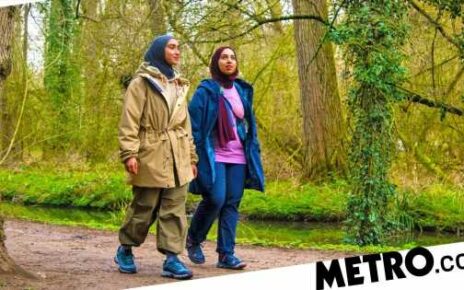“Day-to-day life in a conflict zone like Yemen is tough. That’s why we need women to step up. Women are the hope in this life.”
When war began in Yemen, Nada and her mother were forced to flee their homes in Hodeidah. The 30-year-old had to leave behind her job, which had supported the family, in order to seek safety in Taiz.
Nada lost one of her 15 siblings due to the conflict – her brother was killed after being hit by shrapnel. In her new home, she couldn’t find work despite having a degree in computer science and a diploma in English, and instead began making and selling sweets in order to afford medication for her mother, who has a tumour in her spine.
Despite these personal struggles, Nada wanted to do something to step up and help her community.
The area she moved to is also affected by the conflict. Around 30 years ago, a modern road was built to make journeys easier and faster. Due to war, this road has been blocked and cannot be used, so instead, locals have been using an older road that can cause what should be a 30-minute journey to take as long as seven hours.

After years of not being used, the old road was in a terrible state. Trees had fallen, blocking the route, and parts of the road had washed away, making it bumpy. As a result, people in the village struggled to access the basics of healthcare and education – patients couldn’t reach hospitals to receive treatment and Nada remembers a time that a female student took a risky sub-road through the hills to get to school but fell, leading to a severe spinal cord injury.
“Another woman was in labour, and we lost her and the baby,” says Nada. “She passed away with her baby. We couldn’t save them because of the long distance from the village to the nearest health facility.”
Nada knew she needed to take action. Together with a group of around 50 women from the village, she began clearing the debris from the road in an attempt to make it safer to use.
“I called out to people to reopen the old road and women responded to my call. The first woman to respond had lost her baby during delivery on her way to the hospital,” Nada shares. “Once she heard about my initiative to reopen the old, neglected road, she was the first woman to join, and that gave me the strength to move ahead and call for more women to join us.”
It wasn’t easy for Nada to secure support. She says: “Male leaders in my community mocked us and criticised our initiative. They said we would need millions of Rials to fix this road. They also said that we are just a few women incapable of doing anything.”
But Nada refused to give up.
After years of challenges accessing health centres, schools, universities and markets, the village residents can now use the old road again, thanks to Nada and other local women. Their efforts led to media attention and resulted in CARE International implementing a cash-for-work project to help pave the road.
“My dream was to reopen this road and I’ve achieved it,” she said. “I’m actually speechless, everyone here is delighted because of this road. I cannot describe how we feel when we see patients able to reach hospitals and pregnant mothers getting to hospitals on time to deliver their babies safely.”
Reopening the old road has improved the villagers’ health, created new opportunities for employment and improved access to education for the village’s girls and boys.
You may also like
After fleeing war in Ukraine, this woman helps others who are trying to rebuild their lives in Poland
Nada says: “For me, I feel that I was able to save pregnant mothers and their babies and help patients reach the health centres on time. This road has become a lifeline that connects villages, districts and governorates. I served my community, and I’m grateful for that.”
Nada helped bring women together to improve their lives. She hopes that her story will inspire others to do the same.
“My message on International Women’s Day is that women who love to do good deeds should never be fearful. They should never fear anything. There simply is no way to improvement without challenges, obstacles and problems that have to be defeated.”
Nada’s story will feature on the #Walk4Women podcast on International Women’s Day, hosted by Sophie Ellis-Bextor and Helen Pankhurst and produced in collaboration with Stylist. Visit careinternational.org.uk/walk4women to listen, and pledge to #Walk4Women here.
Images: CARE International
Source: Read Full Article

